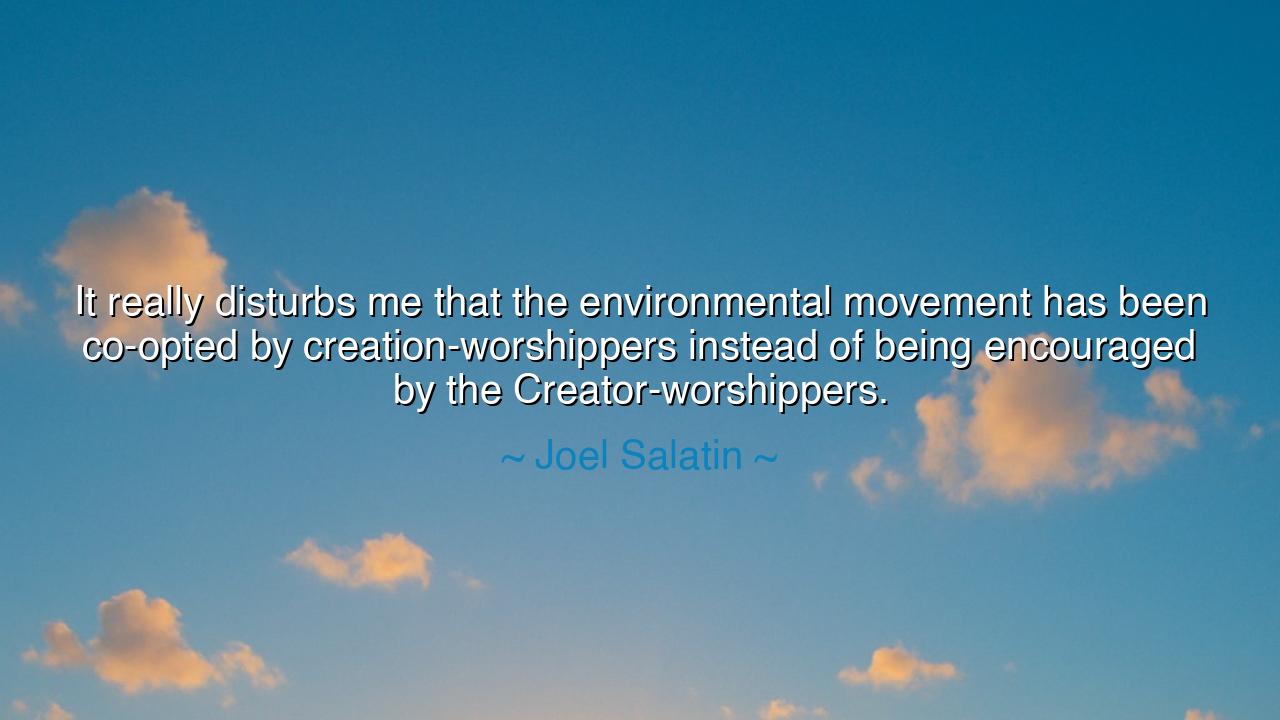
It really disturbs me that the environmental movement has been
It really disturbs me that the environmental movement has been co-opted by creation-worshippers instead of being encouraged by the Creator-worshippers.






Hear, O seekers of wisdom, the challenging words of Joel Salatin, who declared: “It really disturbs me that the environmental movement has been co-opted by creation-worshippers instead of being encouraged by the Creator-worshippers.” In these words lies a cry from the heart of a man who tills the soil and contemplates the heavens. His concern is not merely about stewardship of the earth, but about the spiritual orientation that guides such stewardship. For he sees a danger: that the movement meant to protect the land has shifted from reverence for the Creator to devotion toward the creation itself, confusing the gift with the Giver.
The meaning of this utterance lies in the ancient tension between idolatry and worship. Throughout history, peoples have often lifted their eyes to the mountains, the rivers, the sun and moon, and called them gods. Yet prophets and sages rose to declare: worship not the creation, but He who made it. Salatin, echoing this lineage, warns that the modern environmental movement risks falling into the same trap. To see the earth as sacred is right; to worship it as the highest authority is, in his view, a misstep. For when the reverence for nature replaces reverence for the Creator, the moral compass may drift, untethered from eternal accountability.
Consider the story of ancient Israel at Mount Sinai. They received the law of the Almighty, yet when Moses tarried, they shaped a golden calf and worshipped it. They turned from the Creator to the creation of their own hands. This tale is an echo of what Salatin fears: that noble intentions may degrade into misplaced devotion, that the cry for environmental justice may become entangled with philosophies that exalt earth above heaven, and matter above spirit. His warning is not against caring for creation, but against losing sight of its source.
Yet let us be clear: Salatin does not despise the environmental movement. He himself is a farmer who has long championed sustainable practices, rotational grazing, soil restoration, and the balance of ecosystems. His life testifies to his love for the land. What disturbs him is not the movement’s care for the earth, but its spiritual grounding. For he sees that if Creator-worshippers led the way, then the movement would not merely protect land from harm, but also call humanity into accountability before the One who made the heavens and the earth. Such a foundation, he argues, would be stronger, more enduring, and less prone to error.
History itself bears witness. Think of Saint Francis of Assisi, who loved the birds, the trees, and the rivers, yet never worshipped them. His Canticle of the Sun sings of Brother Fire, Sister Water, and Mother Earth, but always as creations pointing back to their Creator. His reverence inspired reform, humility, and balance, guiding humanity to honor creation without mistaking it for the divine. This is the example Salatin desires for the environmental cause: love for the earth that blossoms from love for the Maker.
The lesson, then, is this: guard against confusing stewardship with worship. Care for the earth passionately, but let that care spring from a higher love. For when reverence for creation is rooted in reverence for the Creator, it gains a moral anchor, a sense of accountability that transcends human whim. Without this anchor, even the noblest movements may drift into confusion or division.
Therefore, O listener, let your love for the earth be wholehearted, but let it also be rightly ordered. Plant trees, reduce waste, live simply, and restore balance to the soil, but remember also to lift your heart in gratitude to the One who gave these gifts. Teach your children that rivers are precious because they flow from His hand, that forests are holy because they whisper His glory. In this way, your stewardship becomes not just practical labor, but an act of worship itself.
So let Salatin’s words endure as both warning and invitation: that the environmental movement, noble though it is, must not forget its highest source. To worship creation is to honor a reflection; to worship the Creator is to honor the light itself. And in honoring the light, we learn how to truly guard the garden entrusted to us.






AAdministratorAdministrator
Welcome, honored guests. Please leave a comment, we will respond soon